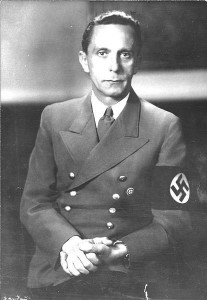I let out a huge sigh of relief after reading the results of a Pew Internet & American Life Project survey released today. It wasn’t because the survey didn’t find social media is isolating us inside digital bubbles. Rather, I was relieved because it didn’t find social media polarizing perspectives and harming democracy. According to Pew’s website:
“We measured ‘perspective taking,’ or the ability of people to consider multiple points of view. There is no evidence that [social networking sites] users, including those who use Facebook, are any more likely than others to cocoon themselves in social networks of like-minded and similar people, as some have feared. Moreover, regression analysis found that those who use MySpace have significantly higher levels of perspective taking.”
 Perhaps, because I respect the works of Jacques Ellul, I’ve been taking a wait-and-see attitude about social media’s predicted role in creating a better world. Ellul saw propaganda (a term he used as an umbrella for all forms of information dissemination) as a drug causing people to stop thinking critically, only seek out information that supports their beliefs, and spread their ideology to others who will in turn reinforce their beliefs. Ellul believed that propaganda distributed through the mass media will one day destroy democracy and freedom “no matter what the good intentions or the good will may be of those who manipulate it.”
Perhaps, because I respect the works of Jacques Ellul, I’ve been taking a wait-and-see attitude about social media’s predicted role in creating a better world. Ellul saw propaganda (a term he used as an umbrella for all forms of information dissemination) as a drug causing people to stop thinking critically, only seek out information that supports their beliefs, and spread their ideology to others who will in turn reinforce their beliefs. Ellul believed that propaganda distributed through the mass media will one day destroy democracy and freedom “no matter what the good intentions or the good will may be of those who manipulate it.”
Until I read the Pew study, I have to admit I was a little concerned social media could cause people to limit themselves to news and blog posts from sources they agreed with and trust—and block out information from opposing viewpoints. This, I worried, would make some people vulnerable to propaganda, particularly the “Big Lie” technique made famous by Adolph Hitler and Joseph Goebbels, the Nazi minister of propaganda. As Hitler wrote in his 1925 autobiography Mein Kampf:
“[I]n the big lie there is always a certain force of credibility; because the broad masses of a nation are always more easily corrupted in the deeper strata of their emotional nature than consciously or voluntarily [Note: Ellul said effective propaganda reflects current sentiments, opinions, tendencies, and stereotypes while playing on people’s needs and desires]; and thus in the primitive simplicity of their minds they more readily fall victims to the big lie than the small lie, since they themselves often tell small lies in little matters but would be ashamed to resort to large-scale falsehoods. It would never come into their heads to fabricate colossal untruths, and they would not believe that others could have the impudence to distort the truth so infamously. Even though the facts which prove this to be so may be brought clearly to their minds, they will still doubt and waver and will continue to think that there may be some other explanation. For the grossly impudent lie always leaves traces behind it, even after it has been nailed down, a fact which is known to all expert liars in this world and to all who conspire together in the art of lying.”
Goebbels, who refined the technique during the Holocaust, put forth a slightly different theory:
“If you tell a lie big enough and keep repeating it, people will eventually come to believe it. The lie can be maintained only for such time as the State can shield the people from the political, economic and/or military consequences of the lie. It thus becomes vitally important for the State to use all of its powers to repress dissent, for the truth is the mortal enemy of the lie, and thus by extension, the truth is the greatest enemy of the State.”
To castrate the “Big Lie,” therefore, you need to be able to enable free-flowing ideas to percolate and crowdsource the truth in an atmosphere of trust. Not only does the Pew survey suggest social media is enabling ideas to flow freely through the newly empowered “Fifth Estate,” it also suggests it is conducive to trust:
“We asked people if they felt ‘that most people can be trusted.’ When we used regression analysis to control for demographic factors, we found that the typical internet user is more than twice as likely as others to feel that people can be trusted. Further, we found that Facebook users are even more likely to be trusting.”
Let’s keep our fingers crossed these trends hold and social media drowns any “Big Lie” in a sea of Tweets and “Likes.”
What impact do you think social media will have on democracy and the planet? Please share your predictions in the comments section.